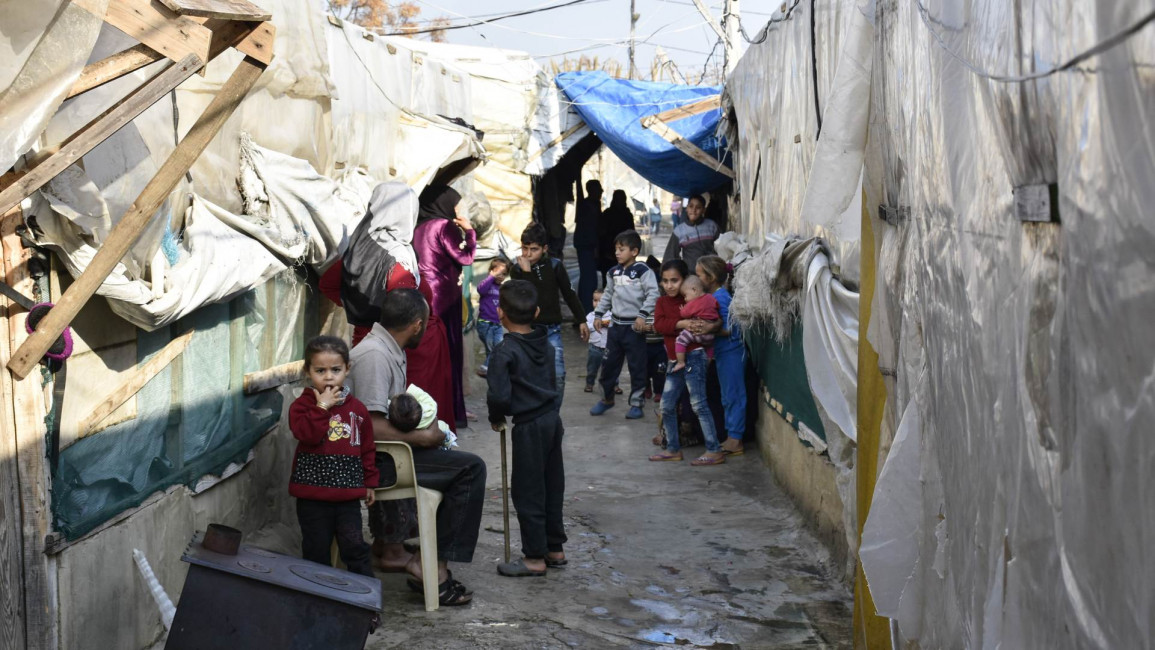Lebanon proposes residency for wealthy investors - but not multi-generational refugees
Lebanon proposes residency for wealthy investors - but not multi-generational refugees
Syrian and Palestinian refugees are explicitly barred in the draft budget from taking advantage of residency by real estate purchase.
2 min read
Around 1.5 million Syrian refugees live in Lebanon [Getty]
Lebanon's caretaker government has proposed offering permanent residency to foreigners who invest in property in the country, while continuing to refuse those same rights to thousands of Palestinian and Syrian refugees.
The 2021 draft budget would allow any foreigner purchasing residential real estate in Lebanon to be granted permanent residency, alongside the investor's spouse and children.
The real estate holdings would have to be worth $350,000 or more if located in Beirut, or $200,000 or more if located outside of the capital, local media reported.
However, the draft budget specifies that both Syrian and Palestinian refugees would be excluded from accessing permanent residency that way.
Legal residency is "virtually impossible" to obtain for the 1.5 million Syrian refugees living in Lebanon, according to the Civil Society Knowledge Centre.
The UN refugee agency estimates that more than 70 percent of people who fled from neighbouring Syria due to the brutal civil war do not have legal residency in Lebanon.
Most also lack permission to work, with the exception of three poorly paid sectors: agriculture, construction, and cleaning.
Palestinian refugees living in Lebanon - both descendants of those who fled Israeli forces in 1948 and 1967 - are entitled to residency in the country but not citizenship, rendering most stateless.
The around 400,000 Palestinians are only able to access healthcare, education and other social services through the United Nations Relief and Works Agency for Palestine Refugees in the Near East (UNRWA); their right to work is also restricted.
Stateless Palestinians were barred from buying property in Lebanon under a 2001 law.
Follow us on Facebook, Twitter and Instagram to stay connected
The 2021 draft budget would allow any foreigner purchasing residential real estate in Lebanon to be granted permanent residency, alongside the investor's spouse and children.
The real estate holdings would have to be worth $350,000 or more if located in Beirut, or $200,000 or more if located outside of the capital, local media reported.
However, the draft budget specifies that both Syrian and Palestinian refugees would be excluded from accessing permanent residency that way.
Legal residency is "virtually impossible" to obtain for the 1.5 million Syrian refugees living in Lebanon, according to the Civil Society Knowledge Centre.
The UN refugee agency estimates that more than 70 percent of people who fled from neighbouring Syria due to the brutal civil war do not have legal residency in Lebanon.
Most also lack permission to work, with the exception of three poorly paid sectors: agriculture, construction, and cleaning.
Palestinian refugees living in Lebanon - both descendants of those who fled Israeli forces in 1948 and 1967 - are entitled to residency in the country but not citizenship, rendering most stateless.
The around 400,000 Palestinians are only able to access healthcare, education and other social services through the United Nations Relief and Works Agency for Palestine Refugees in the Near East (UNRWA); their right to work is also restricted.
Stateless Palestinians were barred from buying property in Lebanon under a 2001 law.
Follow us on Facebook, Twitter and Instagram to stay connected



